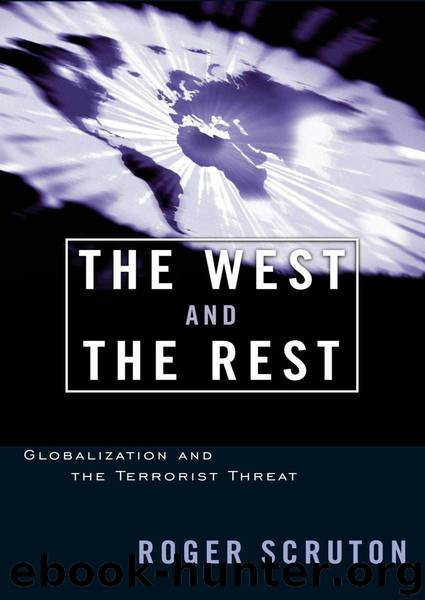The West and the Rest: Globalization and the Terrorist Threat by Roger Scruton

Author:Roger Scruton [Scruton, Roger]
Language: eng
Format: epub, pdf
ISBN: 9781497649064
Publisher: Intercollegiate Studies Institute
Published: 2014-05-13T00:00:00+00:00
CHAPTER 4
GLOBALIZATION
IT IS THANKS to Western prosperity, Western legal systems, Western forms of banking, and Western communications that human initiatives now reach so easily across frontiers to affect the lives and aspirations of people all over the globe. However, as my argument has implied, Western civilization depends on an idea of citizenship that is not global at all, but rooted in territorial jurisdiction and national loyalty. By contrast, Islam, which has been until recently remote from the Western world and without the ability to project its message, is founded on an ideal of godliness which is entirely global in its significance, and which regards territorial jurisdiction and national loyalty as compromises with no intrinsic legitimacy of their own. Although there have been attempts to manufacture nationalisms both appropriate to the Islamic temperament and conducive to a legitimate political order, they have fragmented under the impact of sectarian or tribal allegiances, usually giving way to military dictatorship or one-man, one-family, or one-party tyranny. Islam itself remains, in the hearts of those who live under these tyrannies, a permanent call to a higher life, and a reminder that power and corruption will rule in this world until the reign established by the Prophet is restored.
Terrorism has a long history in the Islamic countries, being the usual recourse of those who reject the legitimacy of the prevailing sovereign power. Until recently, however, it modeled itself on the Assassins, and took powerful or symbolic individuals as its targets. In nineteenth-century Russia, terrorism took a new and more destructive form, involving indiscriminate bombings and acts of destruction which, according to one estimate, claimed 17,000 victims between 1894 and 1917.1 The Russian methods finally led to a successful revolution, and have been adopted by the postwar nationalist movements in Western Europe, notably by the IRA and ETA, as well as by the urban revolutionaries of the 1960s in Italy, France, and Germany, by the PLO, and by the left-wing insurgents in Latin America. Those groups have formed mutually supportive networks for the exchange of training and expertise, and it is due to the globalizing process that these networks are available also to the Islamist extremists.
Nevertheless, Islamist terrorism is a distinct development in two ways. Islamism is not a nationalist movement, still less a bid to establish a new kind of secular state. It rejects the modern state and its secular law in the name of a “brotherhood” that reaches secretly to all Muslim hearts, uniting them against the infidel. And because its purpose is religious rather than political, the goal is incapable of realization. The Muslim Brotherhood failed even to change the political order of Egypt, let alone to establish itself as a model of Koranic government throughout the Muslim world. Where Islamists succeed in gaining power—as in Iran, Sudan, and Afghanistan—the result is not the reign of peace and piety promised by the Prophet, but murder and persecution on a scale matched in our time only by the Nazis and the Communists.2 The Islamist, like
Download
The West and the Rest: Globalization and the Terrorist Threat by Roger Scruton.pdf
This site does not store any files on its server. We only index and link to content provided by other sites. Please contact the content providers to delete copyright contents if any and email us, we'll remove relevant links or contents immediately.
The Secret History by Donna Tartt(19052)
The Social Justice Warrior Handbook by Lisa De Pasquale(12187)
Thirteen Reasons Why by Jay Asher(8893)
This Is How You Lose Her by Junot Diaz(6877)
Weapons of Math Destruction by Cathy O'Neil(6264)
Zero to One by Peter Thiel(5786)
Beartown by Fredrik Backman(5737)
The Myth of the Strong Leader by Archie Brown(5499)
The Fire Next Time by James Baldwin(5431)
How Democracies Die by Steven Levitsky & Daniel Ziblatt(5215)
Promise Me, Dad by Joe Biden(5141)
Stone's Rules by Roger Stone(5081)
A Higher Loyalty: Truth, Lies, and Leadership by James Comey(4954)
100 Deadly Skills by Clint Emerson(4921)
Rise and Kill First by Ronen Bergman(4779)
Secrecy World by Jake Bernstein(4741)
The David Icke Guide to the Global Conspiracy (and how to end it) by David Icke(4701)
The Farm by Tom Rob Smith(4502)
The Doomsday Machine by Daniel Ellsberg(4484)
